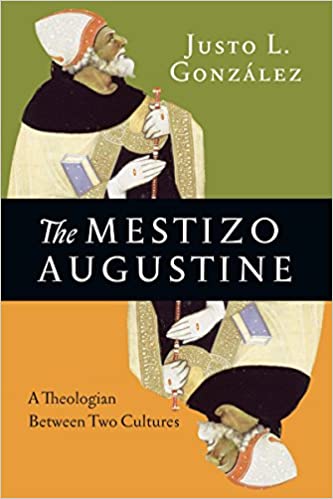The Mestizaje and a Man Formed by God
The Mestizo Augustine was written to an intercultural audience who is trying to discover what it means to respect each individual’s heritage while paving the way for the faith that thrives in a world of mixed backgrounds. This book’s author came from a diverse racial background himself and is using his own story and the felt need to pull the reader back in time to learn from the fourth century, Augustine. The word mestizaje is used to convey the Spanish idea of being from two worlds, literally defined as “From two breeds,” yet not distinctly identifying with one to which an individual can belong (15). Justo González, the author, identifies with this word personally and empathizes with a Latino culture that has “mestizo” as those within it try to find his or her identity.
González, Justo L., The Mestizo Augustine: A Theologian Between Two Cultures. Downers Grove, IL: IVP Academic 2016.
The author strives to uses Augustine to apply principles of Augustine being “Between two worlds” the contemporary church and individual today (18). While his mother’s tradition and his father’s heritage seemed to both call Augustine to live a certain way, he ultimately had to navigate his mother’s African descent and his father’s Greco-Roman influence to pave his own path for life and godliness. Upon his conversion, he found the best of both of these pasts, his mother’s faith, and his father’s rhetoric, and used them to further the Kingdom of God. Those at times he had to choose between his African roots or his Roman order, both backgrounds worked toward his advantage to be persuasive in his speech, life, and writing. All of Augustine’s life seems to point toward the greater purposes God was going to fulfill in Augustine’s life, and this certainly includes the ethnic backgrounds of his mother and father, chosen by God far before he was ever born.
The Book’s Structure and the Portrait of a Powerful Man
The Mestizo Augustine does a wonderful job of journeying through the life of Augustine. While it may fall short on contrasting the Latino culture’s value of such a life, as promised in the introduction (18), he gives a compelling overview of this man’s life. The faith journey of Augustine has many great high and deep low points that must be captured and understood to see him as valuable to the church. His writings, such as Confessions and The City of God, find more meaning when we see these writing set against the backdrop of Augustine’s life. The first two sections of this book tell the story of Augustine’s life before and leading to his conversion and baptism. In the first four chapters, we see the author’s premise of mestizo begin to form and conclusions drawn for the reader about how Augustine’s duel backgrounds gave the framework for his life’s contribution.
In the third and fourth sections of the book, we see the faith of Augustine emerge as González not only gives us a peek behind the curtain of Augustine’s own spiritual growth but also shows us the battle he waged against his former beliefs of Manicheanism. Though it is only a few pages in section four, the explanation of Augustine’s writings against Manicheanism was well done and very informative. He also wrote against Donatist and Pelagianism, but the idea that he could we so moved to write so prolific against the belief system he once held to himself was emboldening and courageous. It seems that he was also not afraid to debate publicly against other Manicheans and ended up seeing some of them turn to the catholic faith as a result of these structured arguments (88).
Sections five, six, and seven are built on the idea of shepherding and the Donatist, Pelagians, and the Pagans. These sections help give the background and context around Augustine’s ministry after his conversion. Not only do we better understand what Augustine did to shepherd and challenge those who prescribed to these religions, but González gives us a thorough understanding of each of these belief systems in the fourth century period. The responses of Augustine, the ensuing debates, and the rise and fall of Rome are all captured well in these chapters, helping us once again understand the context of a man that was living between two worlds yet paving a way theologically.
The final section of the book is a short treatise to understand how we should look through the life of Augustine to bridge and reach the multicultural world in which we minister. For those who come from the Hispanic culture, yet living in the American culture, he gives valid points of application that must be considered. For others, like myself, who are trying to reach a multi-cultural world with the Gospel of Jesus Christ, I am given pastoral insights as to how to be courageous yet careful to reach all people. It is easy for our churches to grow heavy in one cultural group; we must be consistently looking for the mestizo people who are often alienated and need to find a sense of “home” in the church and with God’s people that cannot be found elsewhere.
The Book’s Strengths and Weaknesses
The Mestizo Augustine is a great book, easy for most audiences to read, providing a great summary of the life of Augustine against the backdrop of his original context. I feel the idea of mestizaje is lost at times in the text, but the content is not weakened. The author still provides us a lens for which we should see the future by valuing multi-cultural backgrounds. The book was good at giving an entry-level view of Augustine, yet for the church historian, there is still new territory uncovered and fresh perspectives given.
As a pastor myself, I can say that one of the greatest contributions the book makes is that it gives a bit of a “Behind the scenes” tour to the reader to see the pastoral ministry and philosophy of Augustine. The shepherding parts of this book (which was nearly one-third of the book) gives us a glimpse of how to shepherd those who are far from God, while protecting God’s own from the false religions or faulty belief systems. The example of Augustine is inspiring and should be mimicked. González writes, “We see Augustine as a shepherd seeking to feed his flock and to instruct and correct it when necessary” (72). One of the greatest attributes of this book is the reader can walk away with clearer pastoral insights on how to care for people who come from a multi-cultural background.
For the Latino that may feel this book would provide for them a tool chest of applications to be used when living in Western Culture, he or she will most likely leave this book wanting more. There are applications along these lines, but the author made some big promises here (specifically in the introduction) that may have gone unfulfilled. His passion for church history may have clouded the author’s own view of speaking to his own multi-cultural lifestyle. While Augustine’s story simply told may address this desire, the author could have done a better job at speaking to this directly and providing more practical application. However, I will acknowledge that I am not from this racial decent and so perhaps there were elements of application, specific to this culture I missed. The overarching themes were well taught and well applied.
Critical Interaction and Implications for Today
The multi-cultural background of Augustine has a lot to teach the church. The people of God are no longer tied to one race; since the New Covenant, we have been placed under a new head—Jesus Christ— and all those who believe in Him are united in one body, no matter the background. The idea of mestizo is something that all the people of God experienced as we are both in this world, but also citizens of God’s Kingdom.
Self-Reflections and Actualization
This book calls for the reader to evaluate their own life and ministry. Do we take what we have been given by our parents and minister out of it or in spite of it? Is there a power that comes from understanding we have been divinely created to minister out of our heritage to be people like us — and not like us? What are the implications of embracing our background and using it for the glory of God? A good study of Augustine (or any character in church-history, for that matter) will cause us to look at our own lives and evaluate God’s design of and destiny for and ourselves. The author wrote, “When I study Augustine and his theology I do so in terms of who I am, how I understand myself, and the main concerns and interests not only of myself of an individual but also of the community which I belong” (14).
Speaking of community, we too must look to the cultural background and religious make-up of our mission field and understand how we are to combat it with the truth. Augustine understood the times he was living in and the audiences to which he was called to “Shepherd”. When we see our life in full-view, we will can understand more fully how to use our gives and minister to those who are in mental and spiritual darkness. Recently, I have been ministering to many Hindu and Buddhist people due to an influx of Indian and Chinese people in our area. I would be naïve to think that preaching a protestant white-sounding gospel, ignorant of their backgrounds, will be enough to reach them. Like Augustine, I must understand these other religions and the culturally diverse people within them. I must be patient to explain the gospel in a way that will combat with the objections and get them to think critically about their own religions. Augustine modeled that shepherding within your culture is important and can be done with a firm word and a shepherd’s heart.
Theologians Must Know God’s Heart and Their Audience’s Heart
Augustine was one of the most self-reflective men, however, he was also reflective of the heart of God and the hearts of man. He was a student of God and His character and made it His goal to apply God’s truth to the hearts of those who would hear. There is no doubt that the conversion of Augustine played into how he would reach others. He knew that even he, who was like a chief of sinners (1 Tim. 1:15) needed God and could be saved. Therefore, others also needed to understand the truth of Christ and accept it for the sake of their soul. He had looked dove the edge into the abyss of his own sin and wretchedness and yet the grace of God rescued him from the depth to which he had fallen. Writings such as Confessions show us that he was well aware of what had happened in his own heart, yet he was also aware of what was happening in the hearts of those he was called to serve.
The practice of a good priest, pastor, or spiritual leader is to exegete the hearts of those we serve, just as well as we exegete the truth of God in Scripture. The legal debating skills of Augustine allowed him to take what he knew of the human heart and use it to impart God’s desiring into the context of his hearer’s greatest needs. When we are aware of the hopelessness of the people we speak to, we will be better able to communicate the hope of the Lord as the sole solution for their soul’s needs.
Courage is Not Merely Instantaneous but the Fruit of Faithfulness
The fidelity of Augustine’s mother and the vigor of his Greco-Roman father were Mestizo qualities found in Augustine. His ability to stand for truth was something that was modeled for him in various ways in his life. He had to muster the courage to do great things for God in the latter half of his life. This courage is something that we can look to as an example for us all. He did not just have the courage to stand in various moments, but the whole of his post-conversion life seems to be marked by a faithfulness that gave way to bold and audacious feats. His writings alone, being one of the greatest gifts to the church, were written out of a long faithfulness to deliver what he believed was his to say on God’s behalf. These millions of strokes of the pen were the fruits of faithfulness that emboldened generations to come.
Conclusion
The Mestizo Augustine is a great book for any pastor to read. We are living in a time of blended cultures all over the world. “The world is getting smaller,” some say because the various cultures are co-mingling and finding life together. That means we will have more people who need to be reached that have a mestizaje like Augustine. It also means that more of us will be like Augustine ourselves, duel breed theologians, looking to speak to people of various backgrounds just like us. We need to embrace the power of God’s unique design for our lives and use it for His greater glory.
God never has made a mistake in creating a human to live, breathe, and find their being in Him (Acts 17:28). We need to see this as a benefit for ministry. We need to understand that our own blend of cultures in each of us will inform our values, communications, and relatability to those we minister. God’s design is to be trusted and used for His greater purposes to fulfill His great commission on Earth.







![Where is God when Discouragement Sets In? [Sermon]](https://joshweidmann.com/wp-content/uploads/2022/06/paola-chaaya-eAkjzXCU0p0-unsplash-180x135.jpg)

![How to Help Kids with Anxiety [video]](https://joshweidmann.com/wp-content/uploads/2020/07/mladen-borisov-RzbUUaP2JXY-unsplash-180x135.jpg)





